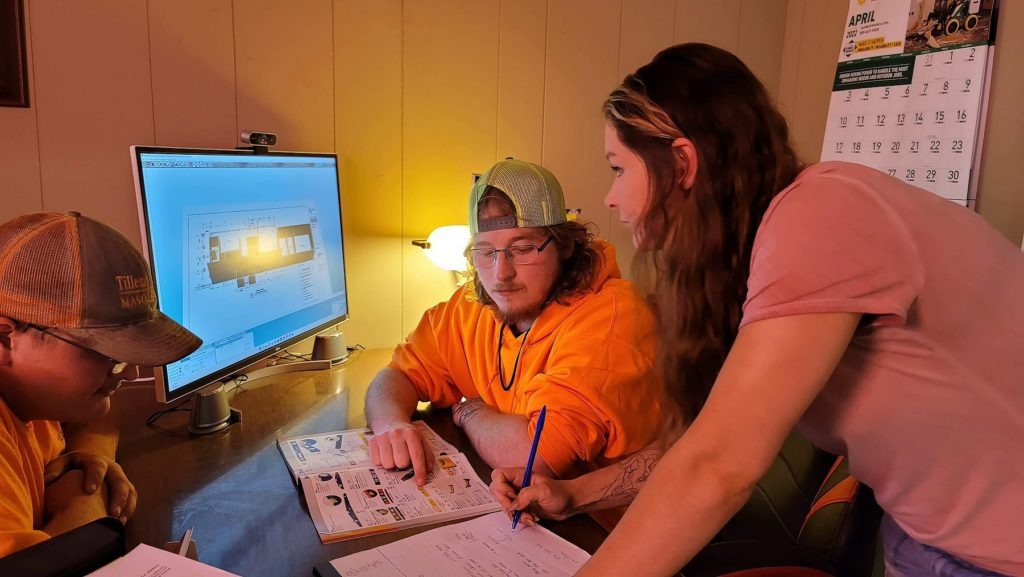Leading With Dignity: How To Overcome Gender Bias As A Female Leader
Words: Tiffany Tillema
Words and Photos: Tiffany Tillema
When I was a little girl, my Dad would come home from his Masonry job, lay his hard hat and lunchbox down, and get ready for dinner. I would immediately grab them up, get on my tricycle and “drive to work” across the living room. The first job I can remember being on was when I was about nine, and my Grandmother took me to my Grandfather's job site, where I played bricklayer in the sand pile. Little did I know that 40+ years later, I’d not only be married to a mason, but I’d own the company! It’s not easy to be a woman in a leadership role, whether you have been in construction your entire life like me or landed a management role straight out of trade school. Gender bias is a real thing, and it knocks a lot of potential leaders out before they can break through the "Brick Ceiling" and meet their true potential. As women in leadership roles, we must learn to deal with these gender biases in a way that dignifies us as women and as leaders.
Masonry is still a male-dominated industry. Women fill only about 4% of leadership roles, and once they get there, it’s hard to retain them. They can successfully fill these roles, and studies show they often surpass men in leadership abilities. So why are there so few of them? It is often the bias and sometimes outright prejudice that keeps women from reaching their full potential.
We tend to want to blame it on the machoism and attitudes of the men in the industry, and although that accounts for some of the problems, there are things we can do that can make it worse or make it much better. The way we react to certain situations, handle ourselves, and do our jobs all factor into the equation. A leader should direct their team toward goals and ensure they have what they need to succeed. They should be able to motivate and inspire everyone on the team, including those in the field. But how can this be done with respect and dignity in what once was a male-only world? This article will discuss some things women can do to gain respect from teammates, focus on what's important, and not give up on themselves.

Gender bias will happen, so prepare yourself to react. The way we respond reflects our character and the company culture. Learn how to detect the different types of bias and how each takes a different approach to resolve. We cannot assume that because someone says something hurtful, it is because they are sexist. It could be the company culture that can be changed with time, or it could be "accidental," which is an unconscious remark where we can gently remind someone they crossed a boundary. It also may be a pattern that needs to be reported and resolved quickly. Suppose we react to every comment or situation where there is some form of bias or prejudice with the same reaction. In that case, we could get a reputation of pulling the "gender card" or, worse, being difficult and emotional. Research and decide on how you will react to different scenarios. There are many good articles to read on dealing with biased comments. Never react on the fly; think about what was said and decide what your reaction should be. Never respond when angry. If you need to cool down for a couple of days, do so. It is better to reflect on what your response should be than to make the job site a place where everyone is uncomfortable. Respect takes time, be patient.
Visiting every job site is extremely important. You would be surprised at how many times I've seen owners and project coordinators skip this step. Your team needs to be comfortable with your leadership, and it is one of the best ways to gain respect from your team, the General Contractor, and the other subs. If they never see you, they will consider you a" pencil pusher" that does not understand them or their needs. While you are there, ask them what they need. Are they having any difficulties? What would make their job easier? Listen to them, have an honest conversation, then give them your card and assure them they can contact you if the need arises. Your team will then know they can trust you. Make sure you follow up on any problems they are having. While you are there, visit the site superintendent, project manager, or anyone else who is connected to your General Contractor. Let them know who you are and assure them that you are available anytime. Make sure they have your direct contact information. Over the years, I have had General Contractors refuse to speak to me over the phone, but they became more willing to work with me after a site visit. Face-to-face contact is a great way to combat stereotypes and biases.

You must believe in yourself. I struggled with this one. I was not a natural when it came to leadership, but how will your team be confident in you if you are not confident in yourself? I still get butterflies when meeting new people; pre-bid meetings are the worst! I feel like the other trades are staring at me, wondering why the mason sent a girl to the meeting! It is OK to be terrified. The more you step outside the box, the more confident you will become. Until that point, you can create an air of confidence. Stand straight, take a deep breath and speak with authority. Remember, you are in your position because someone believed in you. If others believe in you, should you not believe in yourself? Keep a journal of what you do daily or weekly. You will be surprised at how much you have accomplished. Give yourself credit for what you have done! Once you have that confidence in yourself, others will take notice and will put their faith in you!
Find a mentor. There are few women leaders in this industry, partially because of the difficulties in overcoming gender bias. It is often difficult to move your way up the ladder without knowledge and support. I, for one, did not have a woman leader to look up to and learn how to deal with sexist behavior. The struggles were real and complex, especially when I was directly disrespected. There were many times I was frustrated to the point I wanted to give up. Although many of the people I work with were supportive, they didn't understand. A mentor would have saved me much frustration and hours learning to deal with problems myself. Mentors for women in this industry are critical.
Find someone you trust, look up to, and ask for help and advice. When you find that person, remember they have dealt with bias and outright discrimination before you, and they thrive. When your mentor gives feedback, accept it and apply it. They are trying to help, and they have the knowledge you need. I once mentored a young lady that was consistently having trouble communicating with the General Contractors, the other trades, and even her team. I asked her if she ever visited her jobs to see what they were doing and visit face to face with them. She said no. She didn't want to be a mason. That was not the reason she was hired. She had a degree in project management, and that was plenty. I reminded her that as a woman leader, she would need to work harder to gain the trust and confidence of all those involved in every project. It is the nature of the beast. Unfortunately, that was not what she wanted to hear. The point is that you have a mentor to help you. At least try what she suggests.

If you have experience, find someone to mentor. Mentoring others and seeing them grow and gain their confidence is very satisfying. Women mentoring women is essential in the masonry industry. We need women to grow and thrive. We need to retain them as leaders. When women in leadership positions take an interest in others, the industry becomes more diversified, and it improves the relationship between them, thus improving masonry as a whole.
As Masonry becomes more diverse, we will have more opportunities to enhance workplace relationships. How we react to bias on the job can directly affect you and your team. Knowing that conflict will arise, building relationships, developing our confidence, and getting a mentor to help us when we get frustrated are just a few ways we can become strong leaders and build diversity with dignity.